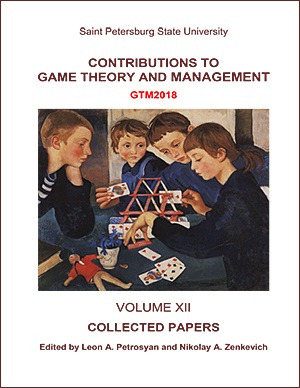Optimal Incentive Strategy in a Discounted Stochastic Stackelberg Game
Abstract
We consider a game where manager’s (leader’s) aim is to maximize the gain of a large corporation by the distribution of funds between m producers (followers). The manager selects a tuple of m non-negative incentive functions, and the producers play a discounted stochastic game, which results in a Nash equilibrium. Manager’s aim is to maximize her related payoff over the class of admissible incentive functions. It is shown that this problem is reduced to a Markov decision process.
Keywords:
Stackelberg Game, Markov decision process, incentive strategy
Downloads
References
Downloads
Published
How to Cite
Issue
Section
License
Articles of "Contributions to Game Theory and Management" are open access distributed under the terms of the License Agreement with Saint Petersburg State University, which permits to the authors unrestricted distribution and self-archiving free of charge.




